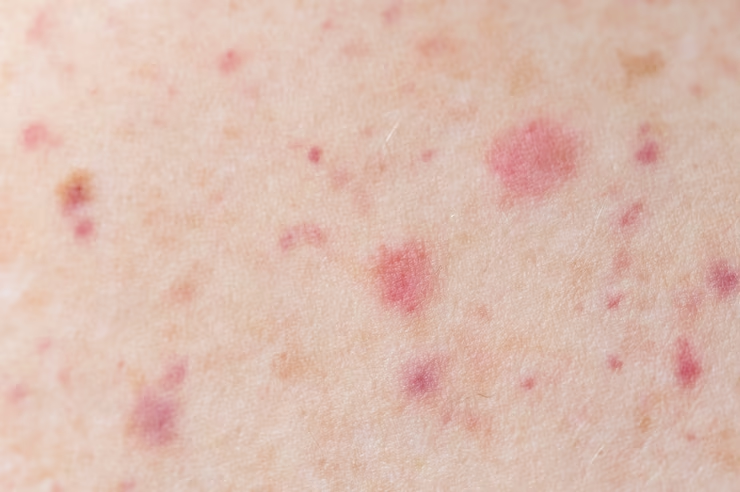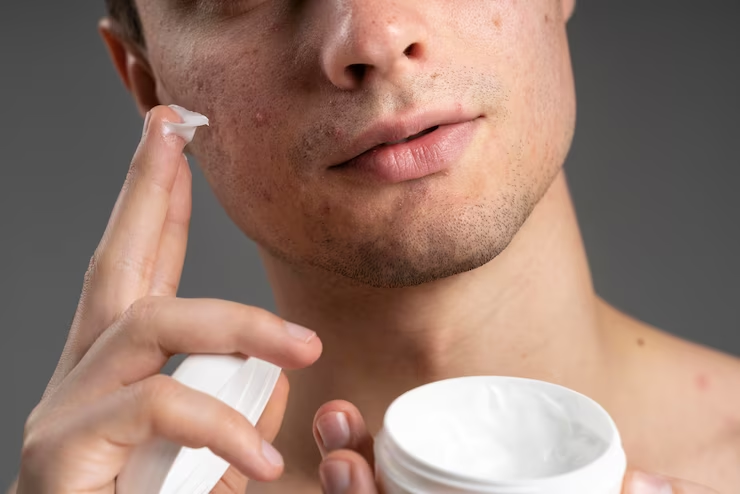
Dealing with stomach pimples can be frustrating, especially when they appear out of nowhere. While often associated with puberty and adolescence, stomach pimples can affect anyone at any age. Regardless of the cause, knowing that effective treatments and prevention strategies exist to help clear up those pesky blemishes is essential.
In this blog post, we'll cover everything you need to know about pimples on the stomach, from their common causes to proven prevention tips and treatment options. We'll also delve into the symptoms to watch out for and when it may be necessary to seek medical attention.
By the end of this post, you'll have a comprehensive understanding of how to prevent and treat stomach pimples, so you can enjoy clear, healthy skin without the frustration of dealing with breakouts.
Causes of Pimples on the Stomach
Poor hygiene
Poor hygiene although not a direct cause it might aggravate acne on skin (but it is not proven).
To prevent pimples worsened by poor hygiene, individuals should wash the skin on their stomachs twice a day with a gentle cleanser, paying particular attention to areas where sweat and dirt may accumulate.
Sweat and friction can worsen acne
Sweat, heat and friction can also contribute to the formation of pimples on the stomach. Activities that cause sweating or rubbing of the skin (exercise or wearing tight clothing) can lead to irritation and inflammation of the skin, which can create an environment conducive to the formation of pimples.This type of acne is called acne mechanica. You get this type of acne when sports equipment or clothing traps heat and sweat on your skin. As the equipment or clothing rubs against your heated skin, your skin becomes irritated. If you have acne or acne-prone skin, this irritation can cause new acne breakouts.
To prevent pimples caused by sweat and friction, individuals should wear loose-fitting clothing made from breathable materials, such as cotton or moisture-wicking fabrics, and shower or wash the skin on their stomachs as soon as possible after sweating.
Sweat itself does not cause acne. It has antibacterial properties and helps to cool down and flush out oil from the pores. However, sweat can contribute to acne breakouts if it mixes with bacteria, dirt, or excess fat on the skin. This can happen when sweat stays on the skin too long or when it is trapped under layers of oil. Therefore, it is important to wash the skin after sweating
Ingrown hairs
Ingrown hairs can also cause pimples on the stomach. When hair becomes trapped beneath the skin's surface, it can cause inflammation and the formation of a pimple. This can occur anywhere on the body where hair grows, including the stomach. Ingrowing occurs when you remove your hair by waxing or shaving.
To prevent ingrown hairs and the pimples they can cause, individuals should avoid shaving or waxing the skin on their stomachs, as this can increase the risk of ingrown hairs. Not shaving very close to the skin will help. You should seek professional hair removal services if hair removal is necessary.
Hormonal imbalances
Hormonal imbalances (especially testosterone, estrogen and progesterone)can cause changes in the skin's oil production, leading to clogged pores and the formation of pimples. During puberty, hormonal changes can cause an increase in oil production, which can contribute to the formation of pimples on the stomach and other areas of the body.
Men can manage pimples caused by hormonal imbalances by seeking medical treatment, such as prescription acne medications.
Symptoms of Pimples on the Stomach
Pimples on the stomach can be uncomfortable and unsightly and may even be a sign of a more severe skin condition. Knowing the symptoms of pimples on the stomach can help you identify and treat them early before they become a bigger problem.
Here are some of the most common symptoms of stomach pimples so you can recognize them and take appropriate action:
Redness and inflammation
When a pimple forms on the stomach, it often becomes inflamed, leading to redness around the affected area. This redness can range from mild to severe and may be accompanied by swelling or warmth. Sometimes, the pimple may become so swollen that it feels like a small lump under the skin. This is usually a sign that the pimple is becoming infected and needs medical attention.
Pain or tenderness
Pimples on the stomach can be painful or tender to the touch, especially if they are large or deep. The pain may be a dull ache or a sharp, shooting pain and may be accompanied by pressure or discomfort in the area. The pain may be more intense if the pimple is located in a sensitive area, such as near the belly button.
Pus or discharge
If the pimple becomes infected, it may fill with pus or discharge. This indicates that the pimple has become inflamed and needs medical attention. The pus may be white or yellow and may have a foul odor. If left untreated, the infection may spread to other body areas, leading to more severe health problems.
Itching or burning
Stomach pimples may also cause itching or burning sensations, primarily if they are located in a sensitive area. This can be uncomfortable and may lead to scratching, worsening the inflammation and making the pimple more prone to infection. Itching and burning may be a sign that the pimple is healing, but resisting the urge to scratch or pick at the affected area is essential.
Clusters of pimples
Pimples on the stomach may appear singly or in clusters, and they may be scattered across the stomach or concentrated in one area. If you notice several pimples in one area, it may indicate a more serious skin condition, such as folliculitis (inflammation of hair follicles) or fungal infection.
It's important to seek medical attention if you notice clusters of pimples, especially if other symptoms accompany them.
Scarring
If the pimple is picked or squeezed, it may leave a scar or discoloration on the skin. This can be unsightly and may take several months or even years to fade. Avoid picking or squeezing pimples on the stomach or other body areas is essential to prevent scarring. If scarring occurs, treatments, such as laser therapy or chemical peels, can help reduce the appearance of scars.
Prevention of Pimples on the Stomach

Wear breathable clothing
Wearing breathable clothing can help prevent stomach pimples. Choose loose-fitting clothing made from breathable materials such as cotton or moisture-wicking fabrics, allowing air to circulate and preventing sweat from accumulating. This can help reduce friction and irritation, which can contribute to the formation of pimples.
Practice good hygiene
Practicing good hygiene is helpful in preventing pimples on your abdomen. Wash your stomach twice a day with a gentle cleanser and warm water to remove sweat, dirt, and bacteria that can clog the pores and cause pimples. Do not leave the sweat on your body for long periods especially after a workout. You should also avoid using harsh soaps or scrubs that irritate the skin and make it more susceptible to breakouts.
Avoid tight clothing
Wearing tight clothing can also contribute to the formation of pimples on the stomach. Tight clothing can trap sweat, dirt, and bacteria against the skin, creating an environment conducive to forming pimples. Avoid wearing tight-fitting clothes, especially when engaging in activities that cause sweating or friction.
Use non-comedogenic products
Non-comedogenic products are specially formulated not to clog pores, which can help reduce the risk of stomach pimples. You also avoid using products that contain harsh chemicals or fragrances, which can irritate the skin and cause breakouts.
Avoid picking or squeezing pimples
You should avoid picking or squeezing pimples on your stomach. Picking or squeezing can cause the pimple to become inflamed and may lead to scarring. Instead, gentle spot treatments containing salicylic acid or benzoyl peroxide can help reduce inflammation and speed up the healing process.
By following these preventative measures, men can reduce their risk of developing stomach pimples and maintain healthy, clear skin.
Treatment of Pimples on the Stomach
If you're dealing with stomach pimples, you're not alone. This uncomfortable and unsightly skin condition can affect anyone, and various factors, such as excess oil, friction, and sweating, can cause it. Fortunately, many treatments can help reduce inflammation, unclog pores, and prevent future breakouts.
Here are some options that you can try to achieve a smoother and clearer stomach area:
Topical treatments
Topical treatments are often the first line of defense for treating pimples on the stomach. Spot treatments containing ingredients such as benzoyl peroxide, salicylic acid, or sulfur can be applied directly to the pimple to reduce inflammation and unclog pores. Your dermatologist may prescribe an antibiotic gel for pus filled pimples.
Oral medications
In more severe cases, oral medications may be necessary to treat stomach pimples. Antibiotics can be prescribed to help reduce inflammation and kill bacteria. At the same time, isotretinoin, a powerful medication derived from vitamin A, can be used to reduce oil production and prevent the formation of pimples. These medications should only be taken under the guidance of a medical professional.
Lifestyle changes
Making lifestyle changes can also help treat pimples on the stomach. Avoiding tight clothing, especially during activities that cause sweating or friction, can help prevent pimples. Using gentle cleansers and avoiding harsh soaps or scrubs that irritate the skin can also be helpful. It is a good habit to take a shower after a work out without letting sweat be on your skin for prolonged periods. Eating a healthy diet and regular exercise can reduce inflammation and improve skin health. Try to control your stress by engaging in relaxation techniques such as yoga and meditation.
Professional treatments
Seeking professional treatments can also be effective in treating stomach pimples. Dermatologists can perform procedures such as extractions, using a sterile instrument to remove the contents of the pimple, or chemical peels, which use a solution to exfoliate the skin and unclog pores.

Light therapy, which uses a particular type of light to kill bacteria and reduce inflammation, may also be effective in treating pimples on the stomach.
Individuals can effectively manage and treat pimples on the stomach by using a combination of these treatments. However, it's essential to consult with a medical professional before starting any new treatment regimen to ensure that it's safe and effective for individual needs.
When to Seek Medical Attention
While many skin concerns can be effectively treated with over-the-counter remedies, there are times when a professional evaluation and treatment plan are necessary.
Here are some situations where you should seek medical attention for your skin concerns:
Chronic or severe acne
If you have persistent or severe acne that doesn't respond to over-the-counter treatments, it's time to see a dermatologist. A dermatologist can prescribe stronger medications and create a personalized treatment plan to help you achieve clear skin. You should seek help if there are infected lesions and pus discharge. If you have developed scars in your belly due to picking and squeezing, a dermatologist can offer you treatment like LASER and chemical peeling to get rid of these scars.
Conclusion
Stomach pimples can be a nuisance, but you can effectively prevent and treat them with the proper knowledge and tools. You can significantly reduce the likelihood of future breakouts by incorporating a consistent skincare routine, avoiding triggers, and following the prevention tips discussed in this post. Additionally, if you experience symptoms, don't hesitate to seek medical attention to rule out any underlying conditions.









